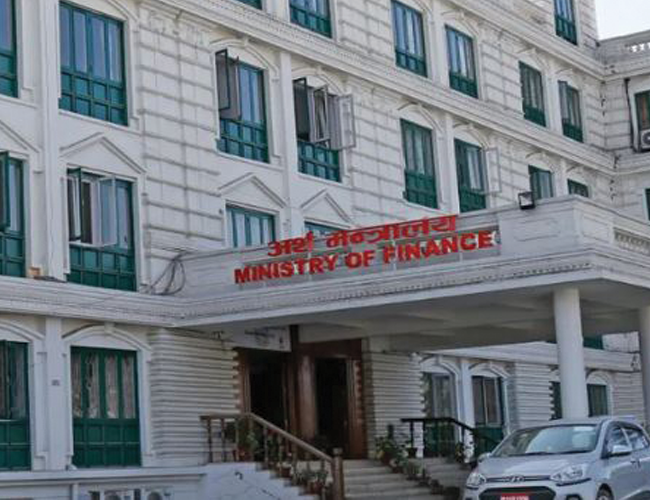
At the end of the half of the financial year 2079/80, Nepal Rastra Bank said that the external sector has reached a comfortable state as the currently announced indicators are much higher than the target. The fact that the Ministry of Finance has a more significant, important and influential role is not hidden from anyone.
Even though Nepal Rastra Bank, which is the country's economic advisor, tries to address the problem through monetary policy, there is a general opinion that it should be more robust. It is necessary to be more effective and efficient.
But the irony is that since the revenue system is based on imports, despite the improvement in the external sector, the pressure is increasing on the government finances.
According to the data of Nepal Rastra Bank, monthly remittances of 1 billion rupees have been received since July. It has improved visibly in the external area. Likewise, there is no improvement in the data on increasing domestic economic activity including import growth, loans to the private sector. The improvement seen in the external sector is only the effect of stabilization of economic activity in Nepal. If the external sector improves, it cannot be said that the internal economic activity will improve. Nepal Rastra Bank also admits that although the external sector has improved, the internal economy is still under pressure.
As the interest rate is decreasing and liquidity is improving, domestic economic activity can be expected to expand in the coming days. In Nepal, the external sector of the economy has improved recently due to increase in remittances, control of imports and reduction in demand due to high interest rates.
The data released by Nepal Rastra Bank recently showed that the pressure on the external sector has decreased while the foreign exchange reserves are decreasing due to high imports and decline in remittances.
According to the data of Nepal Rastra Bank, in the seven months of the financial year 2079/80, i.e. from last July to the end of January, the trade deficit has decreased by 18.7 percent compared to the previous financial year to 8 trillion 25 billion 73 crores.
Remittance increased by 27.1 percent and reached 6 trillion 89 billion 88 million. As a positive effect of this, the current situation is more than 1 trillion 33 billion rupees in savings.
Foreign exchange reserves increased by 13.8 percent compared to the end of last June and reached 13 trillion 83 billion rupees. In the month of January, the consumer price increase is 7.88 percent.
It was 6.24 percent during the same period last year. According to the information of the Central Bank, the inflation of food and beverages is 6.19 percent from last July to January, while the inflation of non-food and service group is 9.22 percent.
During this period last year, inflation of food and beverages was 5.93 percent and inflation of non-food and services group was 6.49 percent.
Nepal expects the government to take concrete and creative economic steps in the interest of Nepal's entrepreneurs, businesses and consumers. Helping entrepreneurs means helping workers.
Two-thirds of the total capital needed by the country's economy is invested by the private sector. Currently, the need for private sector activism has been felt. Business activity and revenue
In addition to the bank interest rate, the new finance minister, who so ever may be in power, should also improve the access period and capacity of the companies listed in the stock market of Nepal.
Regarding workers going abroad, activities should be increased in cooperation with countries that import workers so that the amount of remittances does not decrease. It seems that the cost of remittances should be reduced and the countries that send remittances should be encouraged. The current situation is that the government emphasizes on economic development without focusing on the target of fiscal deficit and there is no coordination between the government and revenue collection and capital expenditure.
In the meantime, it seems that public expenditure should be controlled from the liquidity of the development partners and the country.
It seems that the government and public institutions should adopt a policy of tolerance in frugality without significant expenditure. Work with a serious action plan towards this is expected from the new finance minister
The government should adopt a policy of emphasizing domestic production rather than imports and should not delay in changing the way.
To be finance minister in Nepal, parliamentarians and the party do not need any qualification other than kindness, love and affection. Even skilled politicians can run the economy, but it should be kept in mind that this is a technical ministry. It is an added advantage for a finance minister to know about a subject and more about the finance ministry, but it is not a prerequisite to be a successful finance minister.
Being a minister is about power rather than expertise.
The question is whether you use the power properly or not. That gives the wrong team to the ministers who do not understand the subject which leads to wrong decisions. Therefore, it is imperative to be able to choose the right team, the subjective person will at least have the knowledge supported by the subject of what is wrong in the financial context at the initial stage to take corrective action.
Recently, the representatives of the private sector demanded the appointment of a new minister, saying that the Ministry of Finance is leaderless with the change in the power equation.
They insisted on giving the responsibility of the Ministry of Finance to an experienced person who has a good understanding of the economy in the current situation where the country's economy is in crisis. The private sector is of the opinion that a person who understands the economy more than politics should be the finance minister.
The private sector has an understanding that it will be easier to understand and solve problems if a 'technocrat' is the finance minister, but if his team and his intentions are wrong, it can be worse, as the past has shown.
To solve the economic crisis, the suggestions of the private sector should be taken seriously. There is a contraction of demand in the market.
Bank's Non Performing Assets (NPA) has increased, it is seen that it will increase further. The private sector has said that it is time to be aware of this. In order to solve the current problem, the government of Nepal, the Nepal Rastra Bank, and the private sector should all work together. Mentioning that the commercial cost is increasing due to the bank's interest rate, there is a demand that the spread rate between loans and deposits should be limited to three percent.
Recently, banks and financial institutions have been operating under regulatory supervision, but have been targeted by all-round attacks. Organized and well-planned attacks against financial institutions are mentioned and there is also a risk in the banking sector itself.
Keeping in mind the security of bankers, it is certain that it will be difficult to conduct banking transactions in an environment of fear.
A high-level committee has been formed to study the situation of microfinance financial institutions in Nepal and their contribution to the economy. The meeting of the Nepal Rastra Bank Board of Directors has decided to form a high-level committee to study the overall aspects of microfinance. In addition, the economy of some countries in the world is currently in recession. There are also signs of recession in Nepal.
Due to high inflation this year due to bank interest rates and other reasons, consumption has decreased. For this reason, the demand for consumer goods as well as construction materials has also decreased due to lack of demand in the market. According to industrialists and businessmen, the contraction in demand has affected domestic production. At present, production has been reduced by 30 to 60 percent of the industry's capacity.
The impact of the import ban on some items and the instability in the domestic sector of the economy has affected the government's revenue collection.
This year the target collection is even lower than last year. The revenue has not been able to cover the current expenses. As the revenue collection has decreased, the government has cut the budget for development projects.
The government should adopt a policy of emphasizing on domestic production rather than imports and should not delay in changing the way. The country's export trade is weak.
On the whole, amidst the challenges and ample possibilities, the new finance minister must build a good team and accordingly, after considering the work plan and special economic program, it is necessary to bring a very timely budget, including the upcoming budget.
- Do Not Talk Too Much Negatively About Nepal!-Success Or Failure Of Nepal: Is It An Economic Problem? -
- Jun 23, 2024
- A Lot Of Heat Day In Nepal!!! Or Has The Summer Temperature Broken The Record So Far?
- Jun 03, 2024
- Nepal's 2081/82 Policy and Programme, Parliament Obstacles:Some Perspectives
- May 16, 2024
- Impact Of Indian Elections In Nepal
- May 03, 2024
- A Review Of The Handwritten “Gita Saar” Written By Krishna Prasad Lacoul In 1967-68 B.S.
- Apr 19, 2024

















